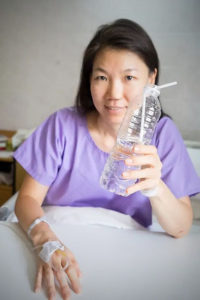We’ve known for some time now that oil-based plastics are toxic.
Most people brush it off, unconcerned. Some people try to avoid using plastics with BPA in them, but BPA-free plastics still contain BPS and other less well known endocrine disrupting chemicals in them, regardless. A few people shun plastic all together or as much as is humanly possible in today’s day and age.
But nobody truly understood the extent of the damage the plastics were causing.
Plastics Cause Androgyny
This is a sensitive topic, and one that many academics won’t even discuss for fear of retribution from people who can’t handle the truth and don’t want to discuss the facts. Plastics contain Bisphenol-A, Bisphenol-S, diethylstilbestrol (DES), and a whole range of other endocrine disrupting chemicals. These chemicals mimic hormones and bind with receptors in the body, causing men to become more feminine, women to become more masculine, and offspring of people exposed to these chemicals more likely to be gay.
That’s right, plastics are making people gay.
A study on putative steroid receptor antagonists in bottled water found out of 18 brands analyzed, 16 of them were anti-androgenic and inhibiting the androgen receptor by up to 90%. The androgen receptors are DNA-binding transcription factors that regulate gene expression. Androgen-regulated genes are essential for the development and maintenance of the male sexual phenotype.

Plastics have a huge impact on sperm counts, fertility, as well as the hormone levels in yet-to-be-born babies. However, these are not the only adversary we as a society face in these areas. Mobile phone radiation and even estrogen being absorbed from birth control pills, both through drinking water and sexual contact with women taking them, are playing a huge part in the dramatic decline in men’s sperm counts, fertility, and testosterone levels.
These chemicals stay in the body and cause all sorts of illnesses and disorders, including..
Plastics are Making Us Sick
A study in mice reveals that prenatal exposure to endocrine-disrupting chemicals, such as bisphenol-A (BPA) and diethylstilbestrol (DES), appear to program fetuses for life. The chemicals in plastic interfere with hormone biosynthesis which results in adverse developmental, reproductive, neurological and immune effects in both humans and animals. This specific study focused on breast cancer, however other studies show these chemicals from plastics can also cause many other forms of cancer as well as a variety of other serious health issues including silicosis, cardiovascular disease, and chronic obstructive pulmonary disease.
A March 2023 study, published in the Annals of Global Health medical journal showed “Plastic production workers are at increased risk of leukaemia, lymphoma … brain cancer, breast cancer, mesothelioma … and decreased fertility. Plastic recycling workers have increased rates of cardiovascular disease, toxic metal poisoning, neuropathy, and lung cancer.”
Residents of communities in close proximity to plastic production and waste disposal sites experience higher risk of premature births, lower birth weights, asthma, leukaemia (especially in children), cardiovascular disease, chronic obstructive pulmonary disease, and lung cancer. Evidence suggests that unborn babies and young children are at particularly high risk. The Guardian wrote a good summary of the findings of this study which you can read here.
Why This is Important to Me
I’m often in Thailand and ever since I first visited here I have wondered why there were so many more gay and transgender people here compared to any other country I’ve visited. When I learned more about how plastics affect our genetics, hormones, and sexuality, things started to make sense. It’s something academics can’t talk about because they get publicly attacked and ostracized, but in Thailand (which has the highest number of trans people per capita in the world, in my opinion*) it’s quite obvious that the population here is exposed to very high levels of plastic contamination on a daily basis.
Here street food is often sold in small plastic bags, even dishes that contain boiling soup or sauces. High heat especially causes chemicals in the plastic to release into the food, slowly poisoning the people who later consume it. The culture here is also excessively reliant on single-use plastics, and it’s very hard to avoid them.
That said, since health is one of my passions, and I’m currently studying and experimenting with methods relating to anti-aging and boosting testosterone naturally, I have cut out plastic from my life almost completely in the recent months. I feel really good physically in doing so, alhough it’s is a bit inconvenient at times. I bring a small glass bottle with me from home to use when I’m ordering coffee at a cafe, or I ask them to give me a glass instead of plastic cup if I’m not taking-away. I also bring a big canister of water with me each day from home (I have filtered groundwater) which is made of stainless steel, and I also carry my own extendable stainless steel straw on my key-chain for whenever I need it.
I rarely get take away, but if I do I will take my own glass contained to the restaurant in advance to give them to use for my packaging. This is especially important when I order a curry or something with hot liquid in it, and I refuse to eat food contaminated with endocrine disrupting chemical contamination from being stored in cheap plastic.
If you care about your health, the health of your potential offspring, and the future of humanity, you should also stop using plastics with food and drinks.

